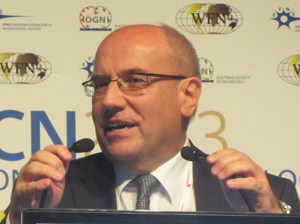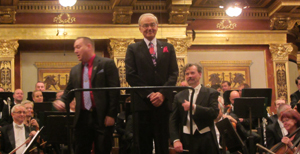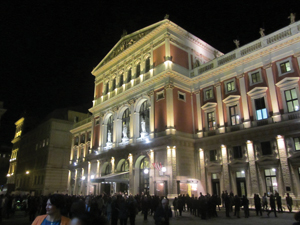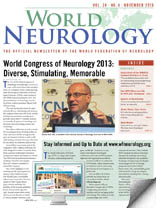
Eduard Auff, MD, is president of the Austrian Society of Neurology, local host of WCN 2013.
By Donna Bergen, MD, Co-chair, Scientific Program Committee
The 21st WFN World Congress of Neurology was held Sept. 21-26 in Vienna, with more than 6,300 attendees from 135 countries. It was a joint meeting with the European Federation of Neurological Societies (EFNS), and constituted the EFNS’ annual meeting for 2013. The Austrian Society of Neurology was the local host, with its president Eduard Auff, MD, presiding.
The joint production made for a particularly diverse, stimulating and memorable congress. More than 350 of the world’s leading neuroscientists and educators provided more than 75 scientific sessions on virtually all aspects of neurology, and led more than 60 teaching courses and workshops.
Few other conferences provide a venue for neurologists from all subspecialties to meet and learn, and for young neurologists and trainees to listen to and to talk with leading scientists who may otherwise be just names in textbooks and journals.
Accessibility was a major goal of the organizers, with a sliding conference fee scale designed to make it easier for those from countries with limited resources, young neurologists and trainees to attend. The WFN also provided travel bursaries, enabling 150 junior neurologists from low resource countries to attend the Congress.
One of the highlights of the meeting was the opening plenary session, when Nobel Laureate Eric Kandel gave a remarkable talk on three innovative Viennese artists of 1900: Gustav Klimt, Egon Schiele and Oskar Kokoschka. In his recently published book, Vienna and the Age of Insight, Kandel related their artistic choices to new theories of mind of Freud [another Viennese], and used 21st century discoveries in functional brain mapping to explain perceptual and esthetic responses to viewing a painting. Other plenary sessions provided an opportunity to hear masterful synopses of developments in neurogenetics by John Hardy, PhD (UK), the neurology of aging by Ayrton Massaro, MD (Brazil), and the recanalization in acute stroke by Werner Hacke, MD (Germany), among others.
For the first time, the main scientific sessions included joint sessions with member organizations of the World Brain Alliance such as the World Psychiatric Association and the World Federation of Neurosurgical Societies. Members of the recently formed network of international neurological subspecialty organizations also convened main sessions in their areas, bringing together the world’s top neuroscientists in nearly every aspect of neurology. Reflecting its growing relationship with the WFN, the World Health Organization presented a session summarizing current programs aimed at neurological disorders such as its Non-Communicative Disease Initiative, which includes stroke as an important global target for prevention and care in the coming years.
The teaching courses took place on each day of the Congress, each day covering the main topic of the next day’s scientific sessions. The courses were attended by more than 4,500 participants. Workshops on EMG, magnetic stimulation and ultrasound of nerve, muscle and intra- and extracranial arteries offered hands-on experience and an opportunity to confer with experts in these fields. Although most of the courses were aimed at consultant neurologists, there was a course especially for young neurologists, and crucial issues such as advocacy, how to write a paper and palliative care also were covered. An analysis of attendance will help guide programming for the WCN 2015 in Chile.

The program included the premier of a waltz composed by Vladimir Hachinski, MD. Hachinski takes a bow.
The Tournament of the Minds is a traditional contest, testing the neurological knowledge of teams nominated by their national societies. The final round was fought between Australia/New Zealand, Chile, India and the United Kingdom. Following 20 questions, the finalists were the U.K. and Australia/New Zealand, with the latter winning the contest, medals and a large trophy. The tournament will be repeated in Chile at WCN2015.
The social program organized by the local host society included a remarkable concert at the stunning Wiener Musikverein Concert Hall. The conductor of the orchestra was Norbert Pfafflmeyer, MD, a practicing neurologist, and the program included the premier of a waltz composed by Vladimir Hachinski, MD, who is finishing his term as president of the WFN. The Heurigen evening at a traditional wine bar gave attendees a taste of the latest Austrian vintage and the local cuisine, and of course, the splendors and history of Vienna were there to enjoy every day.
Abstracts of the platform and poster presentations presented at WCN 2013 will be published in the Journal of Neurological Sciences, the WFN’s affiliated journal.
The next World Congress will take place in Santiago, Chile. During WCN 2013, the WFN Council of Delegates chose Kyoto, Japan, to be the site of the following Congress in 2017.
Bergen is co-chair of the WCN 2013 Scientific Program Committee.

